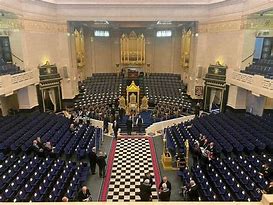
The Illuminati, often described as one of the most secretive and mysterious societies in history, continues to attract public curiosity centuries after its creation. From conspiracy theories linking it to world events, to speculation about its ties with global leaders and celebrities, the subject remains one of the most debated in modern culture.
Although many of the claims about the Illuminati lack verifiable evidence, researchers and commentators have highlighted twelve recurring themes that define public understanding of the group.
Origins in Bavaria
The Illuminati traces its roots to Bavaria, Germany, where it was founded on May 1, 1776, by Adam Weishaupt, a professor of canon law. The society was created to promote enlightenment ideals such as reason, freedom of thought, and resistance against political and religious control. Members sought to challenge the power of the church and monarchy at a time when open criticism was considered dangerous.
Relationship With Freemasonry
The group is frequently linked with Freemasonry, another historic brotherhood known for its secrecy. Historians say that while both movements emphasized symbolism and private membership, they were not the same organization. Some conspiracy theories allege collaboration between Freemasons and the Illuminati, but no historical records confirm such claims.
The “All-Seeing Eye”
One of the most prominent symbols associated with the Illuminati is the “All-Seeing Eye,” often depicted within a pyramid. The symbol, which appears on currency such as the United States dollar bill, has become an icon in discussions about secret power and global control. Though the emblem predates the Illuminati, it is now widely linked to the group.

Accusations of Global Influence
Over the centuries, the Illuminati has been accused of manipulating world events from behind the scenes. These allegations include control over governments, financial institutions, and international organizations. While there is no evidence to support such claims, the narrative of a hidden group orchestrating global affairs has become a central theme in conspiracy theories.
Presence in Popular Culture
References to the Illuminati appear frequently in films, novels, and music. High-profile artists have been linked to the society, either through the use of pyramid imagery or lyrical references. Such associations, whether intentional or coincidental, have helped cement the Illuminati’s reputation in modern culture.
Religious Beliefs and Interpretations
For some communities, the Illuminati is not merely a political or social theory but a spiritual concern. The “All-Seeing Eye” is sometimes interpreted as a symbol of evil or connected to apocalyptic prophecy. This religious interpretation has fueled suspicion and intensified fears about the group’s alleged role in shaping global events.
The Role of Secrecy
The society’s reputation has been amplified by secrecy. With little reliable documentation available, speculation has flourished. The lack of clarity surrounding the Illuminati’s operations has allowed myths and rumors to spread widely, often overshadowing historical fact.
Distrust in Institutions
Analysts note that widespread mistrust in governments, financial systems, and global corporations contributes to the endurance of Illuminati theories. For people seeking explanations for inequality or corruption, the idea of a secret group controlling world affairs offers a narrative that feels persuasive.
Impact of Social Media
In the digital era, social media has played a key role in amplifying Illuminati stories. Videos, hashtags, and viral posts continue to spread claims, particularly among younger audiences. Platforms such as YouTube, TikTok, and Instagram are filled with content linking celebrities, symbols, and major events to the Illuminati.
Alleged Links With Power
Conspiracy theorists often claim that influential world leaders, corporate executives, and entertainers are members of the Illuminati. While such allegations are not supported by evidence, they add to the perception that the group is connected to global power and decision-making.
Fascination Across Generations
Historians argue that the enduring fascination with the Illuminati lies in its mixture of fact and fiction. The blend of documented history, mystery, and speculation ensures that debates about the group remain alive centuries after it was founded.
Lack of Verified Evidence
Despite widespread claims, little verified evidence suggests that the Illuminati continues to exist in the form conspiracy theories describe. Most references today are based on speculation, cultural imagination, and symbolic associations rather than proven activity.
The persistence of Illuminati stories demonstrates the power of secrecy, symbolism, and social distrust in shaping global narratives. Whether fact or fiction, the society remains one of the most enduring and talked-about mysteries in the world.



